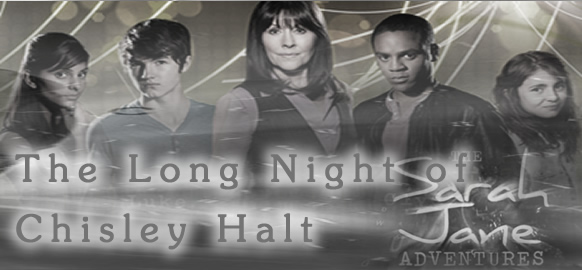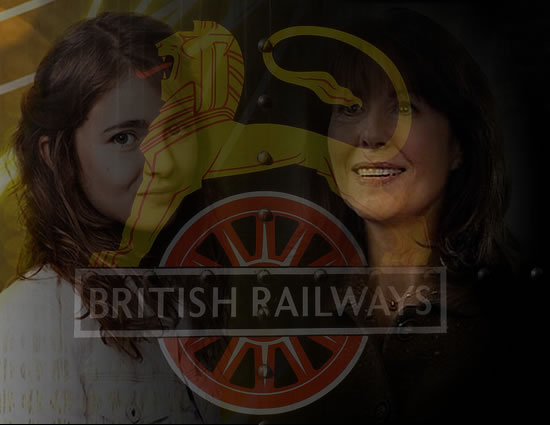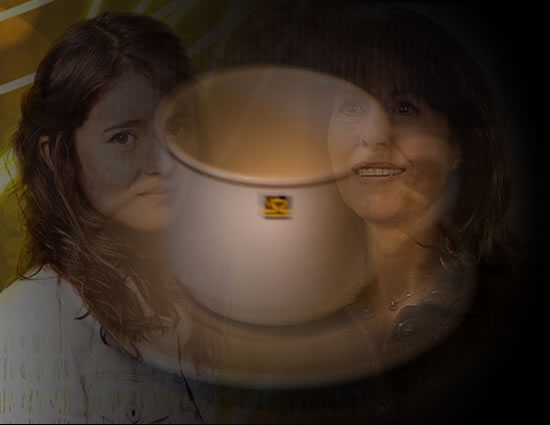

“We’ll come by train.”
Sarah Jane Smith was seriously regretting those four words, now. It had seemed like a good plan when she decided that Sky’s half term would be a great time to join Luke and Pieter at the little cottage in the Norfolk Broads where they were working on one of their post-graduate projects.
The car was being repaired after a nasty standoff with a Chibatun Hammertail. The second part of the name was self-explanatory. How it escaped from a passing galactic zoo ship and caused chaos in Finsbury Park was a longer story and had a lot to do with why Sarah-Jane had decided against a hire car and chosen, instead, a relaxing trip by train.
Eight hours into the journey she knew it had been a mistake. Both she and Sky had eaten as many snacks as they could eat, read all the books they had with them, and had become bored with the scenery long before it got dark and there was nothing to look at.
And now they were faced with a two hour wait on a tiny little station in the middle of nowhere.
“Chisley Halt!” Sarah-Jane looked at the sign despairingly. “Is there really such a place? It sounds like somewhere out of a nineteen-fifties children’s novel – the sort where everyone eats delicious picnics washed down with ginger pop.”
“I hate ginger pop,” Sky pronounced.
“So do I,” Sarah-Jane responded. “At least there’s a waiting room.” She grasped the suitcase and headed towards the little building with a welcome light shining through the window. Sky followed, wearily. Once, every little detail of the world around her had been new and exciting, but she was nearly sixteen, now, a seasoned teenager, and disenchantment set in much more easily than it had when she was twelve.
It was surprisingly pleasant inside the waiting room. Sarah-Jane put down the suitcase and looked appreciatively at a coal fire in a grate closed off for safety by a copper grill etched with the early logo of the nationalised British Rail - a lion curving its body over a train wheel.
The walls of the clean, tidy room were decorated with colourful old-fashioned posters inviting people to visit various east coast seaside resorts by British Railways. Sarah-Jane glowered at the slogan under one for Bridlington – ‘Its Quicker By Rail’. But the potted plants and vases of flowers all around the room and the comfortably padded seats cooled her ire.
She was placated even further when an inner door opened and a woman wearing a clean, white apron asked if she would like a cup of tea.
“Oh, I would love one, thank you,” she answered. “I didn’t expect anyone to be serving at this time. I was going to look for a vending machine, but a proper cup of tea would be heaven.”
In fact, the woman returned with a tray containing a small pot, two cups, sugar and milk. There was a small plate of biscuits, too. Sarah-Jane offered payment and was surprised to be charged less than a pound for such excellent service.
“Have you come far?” asked the woman as Sky tucked into the biscuits and Sarah-Jane sipped a very nice cup of tea.
“London,” she answered. “Not far, really, but so many changes, waiting between trains, and we’re still not there.”
“Yes, I’m afraid we’re a long way off the beaten track here. The slow line to nowhere, and that’s a fact. Very different to London.”
“That’s what I was hoping for,” Sarah-Jane admitted. “A bit of peace and quiet and a slower pace of life, but not until we actually got there.” She sighed deeply. “I’d better phone Luke and let him know that we’re going to be much later than planned.”
“The phone box is up the top end of the platform,” the tea lady told her before she headed back to her own little sanctuary. Sarah-Jane reached into her pocket and brought out her mobile phone. There was no service. She finished her tea and told Sky to wait while she found the phone box.
It was old-fashioned like the rest of the station, a ‘proper’ red phone box that you so rarely see these days.
That was all right. It was the next best thing to the blue box that she loved so much. The iconic design was, she recalled, by Sir Giles Gilbert-Scott, who was also responsible for Battersea Power Station and Waterloo Bridge.
But the phone inside the box was a very strange affair. Sarah-Jane was old enough to remember manual phones, but she had never used one. By the time she was tall enough to operate a payphone they had introduced direct dial connection.
She tried turning the handle and pushing button ‘a’, but the operator couldn’t connect the call. She kept insisting that there were too many numbers in it.
“Mum!” As she stepped back out of the box she heard Sky yelling. Her voice was drowned a moment later by a train whistle and the shuddering, clanking arrival of a steam locomotive at the station. The oddest thing about it was how suddenly it happened. Trains didn’t just turn up that way. They were noisy from a long way down the track.
“Mum!” Sky yelled again and ran to her mother through a press of disembarking passengers. “Mum, it’s all changed inside. Its….”
She looked around. It had changed out here, too. Sarah-Jane took in the differences with the skilled eye of a journalist and didn’t like it at all.
But the only place they could go was back into the waiting room.
The fire was still warming it, but the fireguard now had the logo of the London and North-Eastern Railway – LNER enclosed by an ellipse. The posters on the walls were much less colourful and instead of pictures of holiday destinations there were warnings like ‘Careless Talk Costs Lives’ or exhortations to ‘Dig for Victory’. The window that had been so inviting before was blacked out.
The waiting room was busy. Most of the passengers who had descended from the train were soldiers with their kit bags. They sat on what seats there were or on their bags, or lounged against the walls.
“Here, Missus,” one of the soldiers said to Sarah-Jane. “You have a sit down, here.”
“No, it’s all right,” she answered, wondering if she looked old enough or weary enough to need to sit down. “You need it more. You’ve got much further to go than we do.”
It seemed the right thing to say. The soldier remonstrated, but eventually accepted Sarah-Jane’s wishes.
A young woman brought tea for the soldiers in assorted mugs on a tray. Sarah-Jane and Sky both watched her carefully.
“She’s the same person,” Sky said after a while. “The one who gave us tea and biscuits.”
“Yes, I know,” Sarah-Jane answered. She thought the woman looked about twenty-five now. Earlier she had been about thirty-eight, maybe forty. If this was nineteen-forty-one or thereabouts, then the first version of the waiting room was around about nineteen-fifty-six. That fitted. British Rail was formed in 1948. Manual phones were still in use up until the sixties, at least in rural areas.
Another train whistle signalled the end of the rest stop for the soldiers. They grabbed their kit and headed out. Sarah-Jane and Sky were left on their own in the suddenly much quieter waiting room. The woman brought tea and two biscuits. They were rationed.
“You look like you need it nearly as much as them,” she said. “And it will only go cold before the next train comes in.”
“It’s good of you to provide for them,” Sarah-Jane answered her.
“My Frank is in the army,” she answered. “He said to me, when the war started, Josie, my girl, they need soldiers more than junior station masters. And he joined up.” Josie glanced at Sky. “Is your husband….”
“Yes,” Sarah-Jane replied. “Harry… is a navy surgeon.”
She wasn’t sure why her dearly missed friend came to mind just then. The Brigadier crowded into her thoughts, too. So did brave, brash Sergeant Benton and Mike Yates, and many others, too. But if they had all lived forty years before she had known them, she felt Harry would be the one she would have waited at home for.
“I suppose you don’t hear much from him,” Josie was saying. “The not knowing anything is hard. But we’ve got to muddle through.”
“Yes,” Sarah-Jane agreed. “Do you live near the station?”
“We live IN the station. There’s a little flat over the ticket office. Just a couple of rooms but all right for us. The senior Station Master has eight children. His house is just down the road. They let me stay on while Frank is away. His job and a home will be waiting when it’s all over.”
“Good to hear,” Sarah-Jane said. “Thank you for the tea. It was welcome.”
Josie took their cups and added them to those she was collecting around the room. The washing up would see her through to the next train.
“It’s not time travel,” Sarah-Jane said when she and Sky were alone again. “But it’s not just some kind of vision, either. We’re really here… and we were really here in the fifties. But they must see something a bit different. Our clothes and shoes wouldn’t fit either time and the older Josie didn’t notice that I used a pound coin minted in 2014 to pay for the tea and biscuits. We seem to be ‘fitting in’ somehow.”
“What’s doing it, and will we get back to our proper time?” Sky asked.
Sarah-Jane didn’t know. She opened up her watch which doubled as a mini-computer linked to Mr Smith, a very BIG computer.
It wasn’t responding.
“I don’t know,” she admitted aloud.
Sky looked at her and moved a little closer, putting her hand over Sarah-Jane’s.
“We’ll be all right,” she whispered.
“Of course we will.”
They sat quietly for a little while. As they did so, the room changed subtly again. The pictures were a big clue. They were colourful again, but the style was more - stylised. Sarah-Jane recognised it as the art deco of the twenties and thirties. Funnily enough, in the history books, those were tough times. There was the General Strike, the Jarrow March – which came first? Then the Wall Street Crash making it hard for everyone. But even so, the railway companies were advertising trips to the seaside on their smart new trains.
“It’s day time,” Sky noticed. “I suppose it doesn’t really matter when things are this mixed up.”
The inner door opened and a young man in a smart LNER uniform with shiny peaked cap rushed through. Outside, he blew a whistle as a train came to a stop. Passengers got off and hurried to the way out. There was another whistle and the train departed.
All this, Sarah-Jane listened to. Sky looked out of the window and described, among others, the third class family of mum, dad and six children in patched up but scrupulously clean clothes, a vicar who had travelled second class and a woman in a fur edged coat who was met by a livered chauffer.
“All the social class represented,” Sarah-Jane remarked a little wearily. “Please tell me there isn’t a shabby Russian fainting on the platform.”
Sky laughed. Being born aged eleven and catching up on Earth culture had taken a while, but she was up to date on classic films.
The junior station master came back inside. He looked at Sarah-Jane and Sky and asked if they were waiting for the three-twenty.
“I think we are,” Sarah-Jane replied.
“It’s going to be fifteen minutes late, I’m afraid. “I’ll tell my missus that you’re waiting. She’ll fix you up with some refreshments.”
“That’s quite all right,” Sarah-Jane assured him, but he had already gone into the private room behind the door. Shortly after a very young Josie, a fresh-faced new wife, brought a jug of home-made raspberry cordial and freshly baked currant buns.
“It’s a warm day,” she commented. “I’m sure you’ll be glad of a little something.”
“Thank you,” Sarah-Jane said, truly glad of a change from tea, now. This WAS the time when people were short of money, but raspberries were free, growing in hedgerows, and the drink was sweetened with honey, which was probably gathered for free, as well. Country dwellers had so many colourful and tasty ways to make ends meet.
“It tastes real,” Sky observed. “We’re not dreaming.”
“No,” Sarah-Jane agreed. “It’s not a dream. It’s not anything I’ve experienced before. And I’ve experienced plenty of odd things. This is new. It... doesn’t feel dangerous, though. I think I would know if it was.”
Sky took her mother’s word on that. She DID have more experience of danger than anyone else she knew.
The junior station master came out again to whistle in a train, but this was just a freight one with truckloads of coal and lumber that stopped only to unload some of the coal in the yard. It moved off again and the junior station master returned to his private room.
“I’m starting to wonder what the SENIOR Station Master does around here,” Sarah-Jane remarked.
“That was Josie’s husband who joined up at the start of the war, wasn’t it?”
“Yes, it must be.” Sarah-Jane sighed. “I keep hoping he made it. Silly, really. In our proper time they would both be dead or incredibly old. That’s life, after all. But I just feel as if I want him to get through the war.”
“Is that because of Harry?” Sky asked.
“It wasn’t like that with Harry. If it was ever going to happen with anybody, it would have been him, but it didn’t. Besides, he was a surgeon. He wasn’t front line in any war. I didn’t have to worry about him the way Josie and women like her worried about their men.”
Sky nodded. Sarah-Jane wondered when the little girl she adopted became a soul mate she could admit such deeply personal feelings to.
This strange situation wasn’t frightening, but there WAS a sense of helplessness. They had no power to prevent these jumps back in time and return to their own present.
“I think we’re meant to see a story being told,” Sarah-Jane concluded as the scene changed again in subtle ways. It was maybe ten years earlier and a sunny day. The waiting room door was open. There were sounds outside of a broom on concrete and voices, one male and one female. Sky went to the door and looked. She saw a boy of about fifteen sweeping vigorously and a girl of twelve following him. She had a skipping rope, but wasn’t using it just now. Pestering the boy was more fun.
“Go away, Josie,” the boy told her impatiently “I can’t play games. I’ve got a job, now.”
“You don’t like working,” the girl replied. “You’d rather be fishing.”
“I need to work. Mam needs the extra money I bring home. George isn’t old enough to get a job and the war pension isn’t much.”
The seriousness of his reply stopped the girl in her tracks. She sat down on a crate waiting to be collected by the next goods train and watched him carry on sweeping.
“Anyway, it might be just sweeping and stuff now, but in five years’ time I could be a proper Junior Station Master. I’ll have a uniform and prospects, and when George is bringing in money I’ll be free to make my own way in life.”
“Good,” Josie said. “Then we can get married.”
The boy, obviously named Frank, laughed and paused in his work, leaning on his broom thoughtfully.
“Maybe we will,” he said. “If only to teach you a lesson.”
Josie laughed mischievously and skipped away. Frank shook his head and carried on working, but he smiled as he did so.
“They were childhood sweethearts,” Sarah-Jane commented with a smile. “It sounds as if his father was killed in the First World War. Now I REALLY hope that Frank makes it through the Second. It would be too sad if he didn’t.”
Of course, life wasn’t so simple as that. Things couldn’t happen a certain way just by wishing it could.
And when the scene changed again, it looked as if the worst had happened. Again, the war posters adorned the walls and the window by day was criss-crossed with sticky tape to stop the glass breaking into dangerous shards if the shock wave from a bomb hit it. A man in a post office uniform stood before the inner door holding out a telegram. Josie looked at it and at first refused to take it. When she did, she trembled with awful anticipation. The post man waited as she opened the envelope. Sarah-Jane and Sky, unheeded by the players in this little drama watched silently.
“Oh!” Josie let out a sob. The post man reached out a reassuring hand, but she shook her head. He said a quiet word of kindness and left. Josie stood for a moment, tears filling her eyes. Then she noticed Sarah-Jane and Sky and pulled herself together. She asked if they needed tea.
“We’re fine,” Sarah-Jane answered. “Don’t worry about us. Not at this time, when you’ve had such bad news.”
“It’s not… not so bad,” she said, drawing a deep breath. “Frank isn’t dead. He’s a prisoner of war. He’s on a Red Cross list of those captured. They say that I… I can write to him. But… but I don’t know if I will ever see him again. He might as well be dead.”
“Oh,” Sarah-Jane replied. “Don’t worry. You WILL see him. The war will be over. It….”
Of course, Josie didn’t know that the war would end in 1945. For her it might as well be forever. This news really was as devastating as a death notice.
“Just don’t give up hope,” Sarah-Jane told her. “And I’m sure it will be all right.”
“Thank you,” Josie answered her. “I’ll try.”
She went back into her room. Sarah-Jane sat quietly, glad she had managed to say something comforting, at least. She hoped it helped the young woman with so little to hope for.
“She didn’t recognise us from before,” Sky noted. “That was later than when the soldiers were here.”
“Yes,” Sarah-Jane noted. “I don’t know if it’s because we’re in some kind of continuum or because she sees so many people coming and going that it’s easy to forget faces.”
“Do you think….”
Sky stopped talking as the world around them, bound by the walls of the waiting room, changed yet again. This time there was only a brief interlude in what had to be the summer of 1948. The British Railways logo on the fire surround was brand new and so were the posters explaining how the new National Health Service worked. Josie had obviously made full use of the service already as she emerged from the private rooms pushing a pram. She was smiling widely as she headed out into the sunshine. Sky and Sarah-Jane looked at each other happily as the moment dissolved. Yes, they had seen the worrying question answered. Frank and Josie made it through the war.
The interludes got even faster, like a speeded up film. The posters changed relentlessly and time dashed back and forward between the end of the First World War and the early nineteen sixties. They saw Frank and Josie leave on their honeymoon by train, waved off by friends. They were both very young. Josie must have been barely eighteen, but they were happy. They saw tragedy as their first baby was taken away in an ambulance and later, Frank quietly arranging for a rag and bone man to take a pram away. Sarah-Jane had wondered about that. That had been in the twenties. Their second child, born after the war in the spirit of hope, grew up with the National Health Service to care for his needs. They saw him under his mother’s feet as she changed the flowers in the waiting room and his fifth birthday party in the waiting room with a cake made under the last of the post-war rationing restrictions. Sometimes the scenes flashed back through the war with Josie giving refreshments to the soldiers, or to between the wars when Frank was still hoping for promotion.
Then it stopped again. The station was quiet. It was dark outside. Sarah-Jane looked at the posters for a clue to the era, but they seemed to be a mixture. She stood up to look at them more closely and realised that they were reproductions of classic posters.
“I think…” she began. Then she was distracted by a young man who came into the waiting room wearing modern casual clothes.
“Hello,” he said. “Sorry to startle you.”
“That’s all right,” Sarah-Jane answered. “I just….”
“You look like you’ve seen a ghost,” the young man said. “Can I get you a cup of tea? Not that vending machine stuff outside. I live here with my wife. That’s our little apartment through there.”
“No, thank you,” Sarah-Jane answered. “I’ve had plenty of tea. As for ghosts….” She looked closer at the young man. He looked a little familiar. “Are you….” She stopped. The question she wanted to ask seemed a bit impertinent.
“Oh, my goodness,” the young man said with a wide smile. You’ve seen them.”
Sarah-Jane hesitated. She always did when something normally belonging in a U.N.I.T. classified file came up.
“Josie and Frank. They were my grandparents. I was named Francis Joseph after them both. I’ve seen them often. Other people, from time to time, if they’re ‘tuned’ a certain way, see them, too.”
“We did,” Sky announced. “What happened to them? How come they’re ghosts? They didn’t die horribly, did they?”
“Not at all,” Francis assured her. He sat down to fill them in on the rest of the tale. “They both died peacefully in their eighties. Frank was moved from Chisley Halt when the line closed in the sixties – the Beeching Axe. You’ve probably heard of it. They thought this little place wasn’t worth bothering with. He spent another ten years working in the big station in Norwich, then retired. They bought the old station master’s house and lived right here, maintaining the waiting room and platform just as it used to be. My mum helped Josie serve cream teas to tourists in here. Then not long after they passed away the government started investing in some of the old lines. They wanted to put trains back through Chisley Halt. We took over the flat and actually get paid to maintain the station as it used to be in the glory days. It’s Grade II listed. The ‘ghosts’ weren’t a part of that arrangement. Not that they’re exactly ghosts. It’s more like the waiting room itself retains echoes, complete with posters on the walls and curtains at the window… and if you’re lucky, Josie’s raspberry cordial.”
“That was great,” Sky confirmed.
“The station wanted its own story told,” Sarah-Jane concluded. “I’m glad we were ‘tuned’ to it.”
Small wonder, she thought. All that time with The Doctor, being hypnotised, possessed, exposed to artron energy. It would be amazing if she wasn’t ‘tuned’.
There was a static sound followed by a slightly garbled automatic announcement from a speaker carefully hidden so as to maintain the ambience of the old waiting room.
“That’ll be your train,” Francis said. “They do it by WiFi from a central control centre. No station masters, certainly not junior station masters. They call it progress.”
“I’m not sure I agree,” Sarah-Jane replied. “And I’m sure Frank and Josie wouldn’t.”
Francis smiled warmly and picked up her suitcase. A modern diesel train arrived at the platform and he made sure Sarah-Jane and Sky were safely aboard.
As the train left Chisley Halt Sarah-Jane’s phone bleeped, indicating that there was a signal. She called Luke to tell him they were on their way at last.
“I’ve got quite a story to tell you tomorrow,” she said. “But tonight I just want a cup of cocoa and a nice comfy bed.”
“Me too,” Sky agreed. “And no tea. We’ve had about four decades of it.”

 |
 |
 |